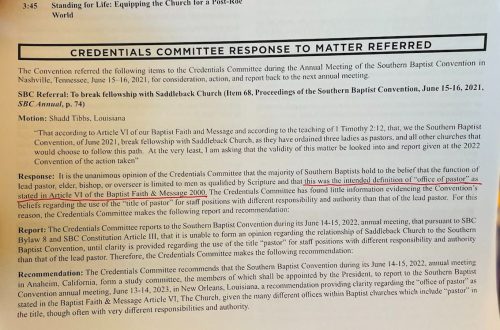When I was a Ph.D. candidate, I had a private conversation over lunch with one of our Theology professors about what it means to be a Baptist. I was green and more naïve than I should have been as a first year doctoral student. During the conversation, I tried to make the point that while believer’s Baptism is essential to being a Baptist, congregationalism isn’t. His response to me was simple, direct, and unperturbed. Congregationalism is just as central to being a Baptist as believer’s baptism.
I left that conversation a little put off by what he told me, but I also left with a renewed zeal to find out for myself whether he was right. It turns out that he was absolutely historically right. At this point in my life, shouldn’t I have already known that congregationalism is essential to being a Baptist? Probably. But I didn’t. Nevertheless, the confrontation forced me to examine the Bible and history to see where I stood on the matter. Was I going to be a Baptist or not? For me, the controversy led not to disaffection but to renewal. It was those early years in my doctoral studies that I became a convinced and unabashed Baptist.
I share that experience as an expression of hopefulness about current controversies in the Southern Baptist Convention on the question of women serving as pastors. Not all controversies have to end in division—even this one. Indeed, if we are humble and attentive, this controversy can lead us to a renewal of our confidence in God’s word and to growth in our understanding of what it means to be a Southern Baptist.
Right now, it seems we are in the midst of a full-fledged conflagration over how to handle the fact that many Southern Baptist Churches have women serving as pastors—some in a senior role and others in a variety of associate positions. At our annual meeting next summer, that controversy will likely focus on the removal of Saddleback from the SBC and on Mike Law’s proposed amendment to the SBC Constitution.
I personally support both Saddleback’s removal and the proposed amendment, and we will see next month whether a majority of messengers feel the same way. For those trying to think through the issues and the motivations of personalities on all sides, I want to offer a word to fellow Southern Baptists about what I’m hoping and praying for in supporting these measures.
If messengers vote in favor of these measures, I am not hoping and praying for an inquisition but for a renewal. What do I mean by that? I don’t want to see churches become disaffected or disassociated by these measures. Rather, I want to see all SBC churches renewed in their commitment to the terms of Southern Baptist cooperation—which means that we would all freely choose to “closely identify” with the Baptist Faith & Message.
I believe that many SBC churches with female pastors in associate positions are not self-consciously trying to drift toward egalitarianism. Rather, they have experienced a little bit of “concept creep” when it comes to their understanding of what a pastor is. Many of these women holding these titles aren’t doing the functions of a pastor (e.g., shepherding the whole congregation) but rather are serving in a ministry that is completely appropriate for gifted women to serve in (e.g., women’s ministry or children’s ministry). I don’t want those churches to leave the convention. I don’t want those women to abandon their important work. But I am praying that such churches might reconsider whether their titles reflect what Baptists historically have believed a pastor to be.
Historically, Baptists have believed that the Bible has three primary terms that refer to the office of leadership in the church—elder, overseer, and pastor. These are three ways of referring to the one office of leadership. An elder/overseer/pastor has the responsibility to shepherd the entire flock, not just parts of it (Acts 20:28; 1 Pet. 5:1-2). A woman serving faithfully in teaching and leading children or other women does real ministry, real discipleship, and real instruction as a part of her ministry (Titus 2:3-6).
Nevertheless, her assignment has her doing this essential ministry over a portion of the congregation and not over the entire flock. Her assignment would also not include teaching and discipling men (1 Tim. 2:12). That is why a title of “minister” would be appropriate for such ministries, but not the title of “pastor.” This is the position that Baptists have held historically, and it’s certainly the position that the Baptist Faith & Message advocates: “While both men and women are gifted for service in the church, the office of pastor is limited to men as qualified by Scripture.”
My hope for such congregations is not that the SBC would disassociate with those churches but that those churches would experience a renewal in their vision for ministry—one that would embrace titles for their ministers that closely associates with what Southern Baptists believe the Bible teaches about the office of pastor. If churches would assign a title of “Minister of ______” rather than “Pastor of ______” to such women, there would be no controversy and both the church’s ministry and their cooperation with the SBC would be renewed and strengthened. I am hoping and praying for this outcome with churches that have experienced a simple “concept creep” with the term pastor.
I am well aware that there are some churches in our convention that appoint female pastors not as a result of correctible “concept creep” but as a result of believing that the Bible allows and authorizes women to be pastors. They intend for women both to hold the title and to carry out the function of a pastor. This is the position of Saddleback Community Church. As their current and former pastors have said publicly, they know that their church’s position does not line up with the Baptist Faith & Message. Instead of quietly disassociating themselves from the SBC, they wish to bring controversy to our annual meeting in order to compel the SBC to change our beliefs to affirm women serving as pastors.
In my view, Saddleback and any other church that knows it can no longer “closely identify” with the BF&M ought to have the integrity to walk away with as little rancor and fanfare as possible and should do whatever they can not to stoke controversy in our annual meeting. The last thing they should be contemplating is to try and remake the SBC in their own egalitarian image. I can hardly imagine a more divisive thing that a cooperating church could do to our convention, and yet it appears that at least some churches have chosen that route. It is not my first choice to disassociate with any church. My first choice would be to see them course-correct and closely identify with what the Bible teaches. Short of that, they must be removed if they won’t remove themselves.
There is more to be said on this issue, and I’m sure I will do so as we move toward the convention. I’m simply writing this post to fellow Southern Baptists to let them know that support for these measures does not grow out of a spirit of inquisition. My hope and prayer for all our churches is not disassociation but a renewal of our cooperation around the BF&M. I want to see more missionaries sent, more churches planted, and more students trained for ministry. We can only do that if we stick together, but that unity will fall apart if we aren’t all committed to the BF&M. I want our cooperation to persevere through the strains we face right now. That is my heart. I hope and pray that is the heart of every Southern Baptist.






